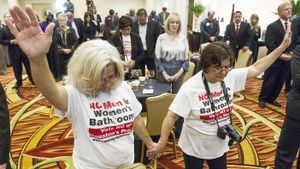Israeli airstrikes have recently escalated dramatically across Lebanon, resulting in substantial casualties among emergency responders. This surge follows the intensifying conflict between Israel and the Iranian-backed group Hezbollah, and it starkly highlights the risks faced by those working on the front lines of humanitarian efforts.
On Thursday, November 14, Israeli airstrikes targeted the Douris civil defense center located near Baalbek, killing as many as 21 rescue workers. This incident, one of the deadliest for emergency responders during the current conflict, was described by officials as "barbaric," with the Lebanese health ministry condemning the attacks on their facilities as clear violations of humanitarian principles.
The strikes occurred amid reports of another airstrike hitting the Arab Salim town's civil defense center early Thursday, where six paramedics were killed. These tragic events are not isolated; since the conflict escalated, more than 200 emergency workers have lost their lives due to Israeli offensives. This figure includes the deaths of 192 emergency and health workers since September alone, underscoring the perilous situation facing those attempting to provide relief and rescue services.
The humanitarian toll is compounded by the broader devastation as Israeli military operations continue to target and destroy what they classify as Hezbollah infrastructures. Despite these claims, the Lebanese civil defense forces, which have no affiliation with Hezbollah, have been dedicated to rescue operations and medical services across the war-torn nation.
Rescue worker Suzanne Karkaba shared the personal anguish of her family’s loss after the strike on the Douris center, recounting how she had to identify her father among the debris, describing him as someone who had dedicated his life to helping others. "My dad was sleeping here with them... But now it’s my turn to pick up the pieces of my dad," she said, tears filling her eyes.
The emotional fallout of such strikes is poignant, with many emergency workers expressing not just sorrow but outright indignation. Haidar al-Afi, who has served as part of the civil defense since 2006, echoed these sentiments, lamenting the loss of friends and colleagues. He remarked, "What did we do? What sins did we commit to deserve this?"
Israeli forces insist their strikes are necessary to dismantle Hezbollah’s military capabilities. This assertion has fueled widespread international dialogue about war crimes and the humanitarian crises stemming from the conflict. Human Rights Watch has condemned the systematic targeting of first responders and has called on international organizations to intervene. They highlighted how over 200 paramedics have died, posing serious questions about the legality and morality of such military actions.
Tragically, the aftermath of these strikes leaves many rescuers digging through rubble for human remains, emphasizing the dreadful consequences of the violence. Search efforts have turned frantic as emergency workers sift through debris to recover the bodies of their comrades.
Attacks on medical and emergency personnel represent violations of international humanitarian law. Bodies are being recovered under harrowing conditions, with rescuers often left feeling despondent due to the overwhelming nature of their losses. Reflecting on their reality, one worker put it succinctly: "We are putting our faith in God; what else can we do?"
The impact of these airstrikes ripples beyond immediate casualties, as the Lebanese health ministry reports over 14,400 wounded across Lebanon since the escalation began. This includes significant casualties among civilians as the conflict claims lives indiscriminately.
Adding to the complex backdrop of the conflict, Israeli military operations have also extended to Syria, where they struck areas known to house members of the Palestinian Islamic Jihad. Such attacks are part of Israel's broader strategy against regional armed groups allied with Hezbollah and Hamas, prompting responses from those parties.
The onslaught has drawn international condemnation, with calls for ceasefire efforts gaining traction. The UN Security Council drafted resolutions for immediate and unconditional ceasefire discussions, urging humanitarian access to affected civilian populations. Statements from regional leaders indicate the need for diplomatic resolution, but the volatility of military actions complicates efforts for peace.
Despite the dizzying array of challenges, and noting the losses among their ranks, emergency workers continue their plight to rescue the living and recover the dead. The sheer courage and resilience they demonstrate—amidst airstrikes and chaos—speak volumes about their dedication to their communities during this harrowing time.
Overall, these devastating events have illuminated the precarious nature of emergency services amid warfare, eliciting international outcry, humanitarian concerns, and calls for accountability.



